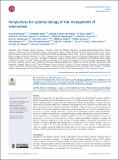Files in this item
Perspectives for systems biology in the management of tuberculosis
Item metadata
| dc.contributor.author | Kontsevaya, I. | |
| dc.contributor.author | Lange, C. | |
| dc.contributor.author | Comella-Del-Barrio, P. | |
| dc.contributor.author | Coarfa, C. | |
| dc.contributor.author | DiNardo, A.R. | |
| dc.contributor.author | Gillespie, S.H. | |
| dc.contributor.author | Hauptmann, M. | |
| dc.contributor.author | Leschczyk, C. | |
| dc.contributor.author | Mandalakas, A.M. | |
| dc.contributor.author | Martinecz, A. | |
| dc.contributor.author | Merker, M. | |
| dc.contributor.author | Niemann, S. | |
| dc.contributor.author | Reimann, M. | |
| dc.contributor.author | Rzhepishevska, O. | |
| dc.contributor.author | Schaible, U.E. | |
| dc.contributor.author | Scheu, K.M. | |
| dc.contributor.author | Schurr, E. | |
| dc.contributor.author | Abel Zur Wiesch, P. | |
| dc.contributor.author | Heyckendorf, J. | |
| dc.date.accessioned | 2021-06-15T09:05:42Z | |
| dc.date.available | 2021-06-15T09:05:42Z | |
| dc.date.issued | 2021-06-30 | |
| dc.identifier | 274588623 | |
| dc.identifier | af97ae21-4ca6-4922-9d4f-2a428217b0dd | |
| dc.identifier | 85106866948 | |
| dc.identifier | 000672820600014 | |
| dc.identifier.citation | Kontsevaya , I , Lange , C , Comella-Del-Barrio , P , Coarfa , C , DiNardo , A R , Gillespie , S H , Hauptmann , M , Leschczyk , C , Mandalakas , A M , Martinecz , A , Merker , M , Niemann , S , Reimann , M , Rzhepishevska , O , Schaible , U E , Scheu , K M , Schurr , E , Abel Zur Wiesch , P & Heyckendorf , J 2021 , ' Perspectives for systems biology in the management of tuberculosis ' , European Respiratory Review , vol. 30 , no. 160 , 200377 . https://doi.org/10.1183/16000617.0377-2020 | en |
| dc.identifier.issn | 0905-9180 | |
| dc.identifier.other | RIS: urn:3A580A924DC324C796651D732F629613 | |
| dc.identifier.uri | https://hdl.handle.net/10023/23360 | |
| dc.description.abstract | Standardised management of tuberculosis may soon be replaced by individualised, precision medicine-guided therapies informed with knowledge provided by the field of systems biology. Systems biology is a rapidly expanding field of computational and mathematical analysis and modelling of complex biological systems that can provide insights into mechanisms underlying tuberculosis, identify novel biomarkers, and help to optimise prevention, diagnosis and treatment of disease. These advances are critically important in the context of the evolving epidemic of drug-resistant tuberculosis. Here, we review the available evidence on the role of systems biology approaches - human and mycobacterial genomics and transcriptomics, proteomics, lipidomics/metabolomics, immunophenotyping, systems pharmacology and gut microbiomes - in the management of tuberculosis including prediction of risk for disease progression, severity of mycobacterial virulence and drug resistance, adverse events, comorbidities, response to therapy and treatment outcomes. Application of the Grading of Recommendations, Assessment, Development and Evaluation (GRADE) approach demonstrated that at present most of the studies provide "very low" certainty of evidence for answering clinically relevant questions. Further studies in large prospective cohorts of patients, including randomised clinical trials, are necessary to assess the applicability of the findings in tuberculosis prevention and more efficient clinical management of patients. | |
| dc.format.extent | 16 | |
| dc.format.extent | 672774 | |
| dc.language.iso | eng | |
| dc.relation.ispartof | European Respiratory Review | en |
| dc.subject | QH301 Biology | en |
| dc.subject | RA Public aspects of medicine | en |
| dc.subject | SDG 3 - Good Health and Well-being | en |
| dc.subject.lcc | QH301 | en |
| dc.subject.lcc | RA | en |
| dc.title | Perspectives for systems biology in the management of tuberculosis | en |
| dc.type | Journal item | en |
| dc.contributor.institution | University of St Andrews. School of Medicine | en |
| dc.contributor.institution | University of St Andrews. Sir James Mackenzie Institute for Early Diagnosis | en |
| dc.contributor.institution | University of St Andrews. Centre for Biophotonics | en |
| dc.contributor.institution | University of St Andrews. Biomedical Sciences Research Complex | en |
| dc.contributor.institution | University of St Andrews. Infection and Global Health Division | en |
| dc.contributor.institution | University of St Andrews. Global Health Implementation Group | en |
| dc.contributor.institution | University of St Andrews. Gillespie Group | en |
| dc.identifier.doi | https://doi.org/10.1183/16000617.0377-2020 | |
| dc.description.status | Peer reviewed | en |
This item appears in the following Collection(s)
Items in the St Andrews Research Repository are protected by copyright, with all rights reserved, unless otherwise indicated.

